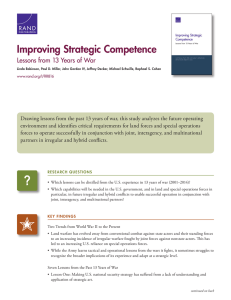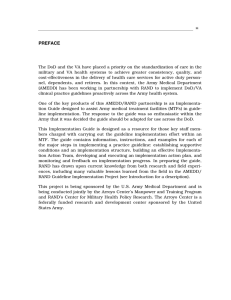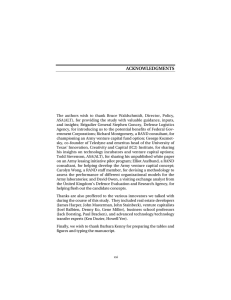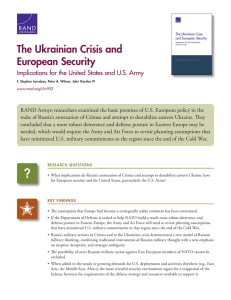Developing U.S. Army Officers’ Capabilities for Joint, Interagency, Intergovernmental, and Multinational
advertisement
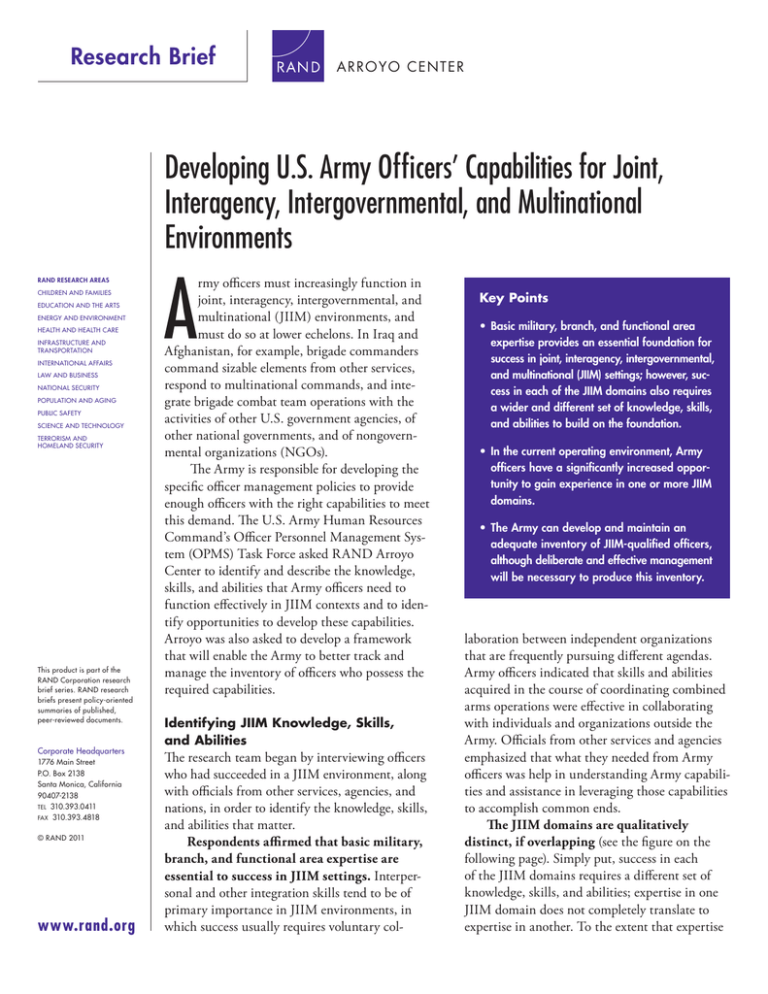
Research Brief ARROYO CENTER Developing U.S. Army Officers’ Capabilities for Joint, Interagency, Intergovernmental, and Multinational Environments RAND Research areas Children and Families Education and the Arts Energy and Environment Health and Health Care Infrastructure and Transportation International Affairs Law and Business National Security Population and Aging Public Safety Science and Technology Terrorism and Homeland Security This product is part of the RAND Corporation research brief series. RAND research briefs present policy-oriented summaries of published, peer-reviewed documents. Corporate Headquarters 1776 Main Street P.O. Box 2138 Santa Monica, California 90407-2138 Tel 310.393.0411 Fax 310.393.4818 © RAND 2011 www.rand.org A rmy officers must increasingly function in joint, interagency, intergovernmental, and multinational (JIIM) environments, and must do so at lower echelons. In Iraq and Afghanistan, for example, brigade commanders command sizable elements from other services, respond to multinational commands, and integrate brigade combat team operations with the activities of other U.S. government agencies, of other national governments, and of nongovernmental organizations (NGOs). The Army is responsible for developing the specific officer management policies to provide enough officers with the right capabilities to meet this demand. The U.S. Army Human Resources Command’s Officer Personnel Management System (OPMS) Task Force asked RAND Arroyo Center to identify and describe the knowledge, skills, and abilities that Army officers need to function effectively in JIIM contexts and to identify opportunities to develop these capabilities. Arroyo was also asked to develop a framework that will enable the Army to better track and manage the inventory of officers who possess the required capabilities. Identifying JIIM Knowledge, Skills, and Abilities The research team began by interviewing officers who had succeeded in a JIIM environment, along with officials from other services, agencies, and nations, in order to identify the knowledge, skills, and abilities that matter. Respondents affirmed that basic military, branch, and functional area expertise are essential to success in JIIM settings. Interpersonal and other integration skills tend to be of primary importance in JIIM environments, in which success usually requires voluntary col- Key Points • Basic military, branch, and functional area expertise provides an essential foundation for success in joint, interagency, intergovernmental, and multinational (JIIM) settings; however, success in each of the JIIM domains also requires a wider and different set of knowledge, skills, and abilities to build on the foundation. • In the current operating environment, Army officers have a significantly increased opportunity to gain experience in one or more JIIM domains. • The Army can develop and maintain an adequate inventory of JIIM-qualified officers, although deliberate and effective management will be necessary to produce this inventory. laboration between independent organizations that are frequently pursuing different agendas. Army officers indicated that skills and abilities acquired in the course of coordinating combined arms operations were effective in collaborating with individuals and organizations outside the Army. Officials from other services and agencies emphasized that what they needed from Army officers was help in understanding Army capabilities and assistance in leveraging those capabilities to accomplish common ends. The JIIM domains are qualitatively distinct, if overlapping (see the figure on the following page). Simply put, success in each of the JIIM domains requires a different set of knowledge, skills, and abilities; expertise in one JIIM domain does not completely translate to expertise in another. To the extent that expertise JIIM Domains Overlap but Are Distinct from One Another Inter- governmental Joint Interagency Joint capabilities Other government agencies capabilities Service capabilities Joint planning Originality U.S. government resourcing processes Statutory and regulatory environment Multinational Allies Partners IGOs, NGOs, PVOs, etc. Stab. ops. theory Project mgmt National Incident Management System Employing Army capabilities MDMP Delegation Adaptability … People Skills Negotiation Written and Oral Communication Critical Thinking NOTE: Most JIIM positions require competence in several domains. is required, developing it requires experience in the relevant domain, not just a short preparatory course. Service at strategic, operational, tactical, and institutional echelons requires distinctly different knowledge, skills, and abilities. That is, jobs at these different echelons differ in kind, not just in degree. The differences between echelons are at least as significant as those between JIIM domains. Developmental Opportunities Arroyo next surveyed assignment officers about the extent to which the positions they managed developed JIIM-relevant knowledge, skills, and abilities. Broadening experiences contribute significantly to competence in the JIIM domains. According to respondents, the single most important preparation for JIIM environments was the opportunity to experience or learn “something different,” i.e., assignments in which officers could not simply rely on their own accumulated experience and knowledge to succeed. For some, that “different” experience was service in the Balkans; for others, it was a tour on a higher-level staff. In the current operating environment, Army officers have a significantly increased opportunity to gain experience in one or more JIIM domains. Naturally, in today’s security environment, most of this experience accrued in the joint and multinational domains. Service in Army positions, such as battalion or brigade commander, executive officer, or operations officer, provided significant experience in integrat- ing joint and multinational capabilities. Key officers on division and higher echelon staffs also accumulated significant interagency experience. Development required deployment and experience in an operational theater, however. In a garrison setting, those same positions provided little opportunity for developing JIIM-relevant knowledge, skills, and abilities. A Framework for Tracking and Managing Officers with Relevant JIIM Knowledge, Skills, and Abilities Arroyo developed a framework to help the Army better track and manage the inventory of officers who possess the required capabilities. The study team assessed the Army’s ability to meet requirements for JIIM personnel using two models. In one, a managing-skills approach, the objective is to ensure that as many officers as possible acquire at least some JIIM experience. In the other, a managing-competencies approach, the object is to develop the maximum number of experts in the JIIM domains. It should be possible to develop and maintain enough officers with the required knowledge, skills, and abilities in the JIIM domains. The Army could meet likely requirements using either model. If the Army adopted a managingskills approach, over two-thirds of lieutenant colonels would have had some sort of JIIM experience by the time they either retired or became colonels. All colonels would have accumulated a JIIM assignment sometime in their careers. With a managing-competencies approach, the Army could produce substantially fewer experts, but with deeper experience; however, it is likely that the resulting inventory would still satisfy demand. Either approach requires deliberate, effective management. Conclusion The Army can develop and maintain an adequate inventory of JIIM-qualified officers without significantly disrupting existing career development patterns. While the strategic environment requires a larger inventory of such officers, current operations provide officers with more opportunities to develop the necessary knowledge, skills, and abilities—although the Army will have to manage its officers deliberately in order to produce the best possible mix of JIIM expertise in its inventory of officers. ■ This research brief describes work done by the RAND Arroyo Center and documented in Developing U.S. Army Officers’ Capabilities for Joint, Interagency, Intergovernmental, and Multinational Environments, by M. Wade Markel, Henry A. Leonard, Charlotte Lynch, Christina Panis, Peter Schirmer, and Carra S. Sims, MG-990-A, 2011 (available at http://www.rand.org/pubs/monographs/MG990.html). This research brief was written by Kristin J. Leuschner. The RAND Corporation is a nonprofit institution that helps improve policy and decisionmaking through research and analysis. RAND’s publications do not necessarily reflect the opinions of its research clients and sponsors. R® is a registered trademark. RAND Offices Santa Monica, CA • Washington, DC • Pittsburgh, PA • New Orleans, LA/Jackson, MS • Boston, MA • Doha, QA • Abu Dhabi, AE • Cambridge, UK • Brussels, BE RB-9631-A (2011) CHILDREN AND FAMILIES EDUCATION AND THE ARTS The RAND Corporation is a nonprofit institution that helps improve policy and decisionmaking through research and analysis. ENERGY AND ENVIRONMENT HEALTH AND HEALTH CARE INFRASTRUCTURE AND TRANSPORTATION This electronic document was made available from www.rand.org as a public service of the RAND Corporation. INTERNATIONAL AFFAIRS LAW AND BUSINESS NATIONAL SECURITY POPULATION AND AGING PUBLIC SAFETY SCIENCE AND TECHNOLOGY TERRORISM AND HOMELAND SECURITY Support RAND Browse Reports & Bookstore Make a charitable contribution For More Information Visit RAND at www.rand.org Explore the RAND Arroyo Center View document details Research Brief This product is part of the RAND Corporation research brief series. RAND research briefs present policy-oriented summaries of individual published, peer-reviewed documents or of a body of published work. Limited Electronic Distribution Rights This document and trademark(s) contained herein are protected by law as indicated in a notice appearing later in this work. This electronic representation of RAND intellectual property is provided for noncommercial use only. Unauthorized posting of RAND electronic documents to a non-RAND website is prohibited. RAND electronic documents are protected under copyright law. Permission is required from RAND to reproduce, or reuse in another form, any of our research documents for commercial use. For information on reprint and linking permissions, please see RAND Permissions.

